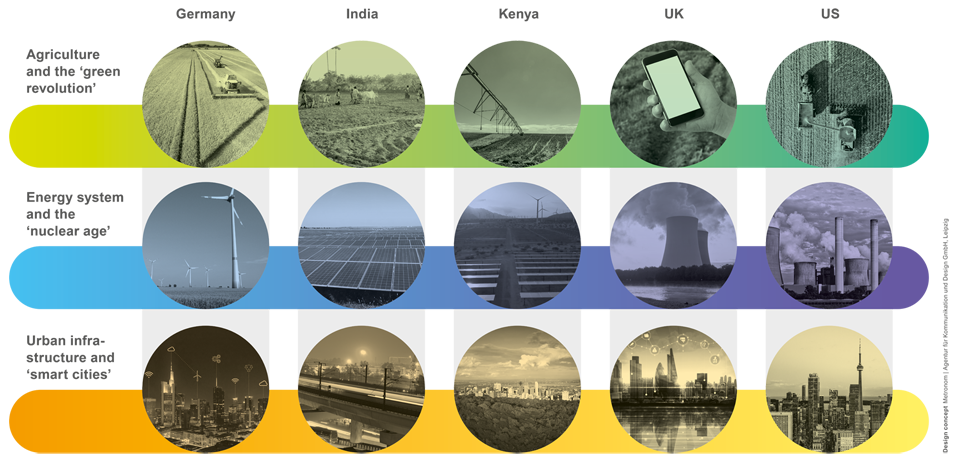About the GoST Project
Project aims
Transformations in systems of energy, agriculture, and urban digital infrastructure are globally recognised as crucial to sustainable development. The research project Governance of Sociotechnical Transformations (GoST) focuses on historical and prospective transformations in three key areas:
- Energy transformation and the ‘nuclear age’
- Transformation of agriculture and the ‘green revolution’
- Transformation’ of the urban digital infrastructure and ‘smart cities.’
The project examines past and prospective transformation efforts across the three areas of energy, agriculture, and urban digital environments, in five countries (Germany, India, Kenya, UK and US).
A key concept for the project, and one which is being used as a theoretical starting point, is that of ‘sociotechnical imaginaries’ within Science and Technology Studies (STS). Sociotechnical imaginaries are collective ideas of past and prospective transformations. They are a way to explore where transformative ideas come from, how they evolve into practise, and how they translate into effective policies. They transcend cultural and geographical boundaries, connecting actors across locations, levels of government and political systems through narratives, modes of reasoning and associated implementation practises.
The project will address two key sets of questions:
1. Understanding COMPLEXITY
- How do sociotechnical imaginaries differ across countries, sectors and time?
- What does this tell us about the complex connections between the economic, social and material dimensions of transformation?
- What do these imaginaries tell us about shortfalls in prior efforts at transformations toward sustainability?
2. Implications for GOVERNANCE
- How can a deeper understanding of these complexities inform more effective and equitable governance? And what are the practical and political implications of accounting for these?
- How can a better understanding of these complexities illuminate alternative pathways to sustainability transformation in the three key areas?
- Which globally-shared imaginations offer the most promise for future policy development?

GoST approach
GoST combines qualitative, observational work at a micro-level with the analysis of primary materials, theoretically informed generalization, and policy recommendations, underpinned throughout by an interdisciplinary approach.
The project uses a number of research methods in order to gain insight into transformations within different sectors and country contexts as well as the processes of social transformation and their relation for governance. Some of these methods include:
- The development of comparative case studies of transformations in the three sectors in the five countries.
- Archival and document research – using local archives and other forms of data collection.
- Analysis of national laws and policies aimed at fostering transformations and relevant legal challenges and court decisions.
- Conducting interviews with policy-makers, businesses and members of civil society.
- The exploration of images and other visual/non-verbal imaginaries such as films, TV, cartoons, internet memes.
- Engagement workshops in India and Kenya bringing together policy-makers, non-governmental organisations and community organisations.
Societal relevance
The research helps to improve the understanding of the multi-dimensional and transformative potential of imagined futures – an area that has been insufficiently recognised in scientific literature and policy making. Similarly, by looking at Transformations to Sustainability (T2S) imaginaries in the North and the South, the project provides a deeper perspective on the differences in imagining T2S across a variety of sectors and national policies.
The project specifically tailors impact towards improving economic and welfare outcomes for people in the project’s two Official Development Assistance countries (Kenya and India). Firstly, by drawing out relevant development lessons and identifying alternative choices and pathways to sustainability and, secondly, by fostering research and practise collaborations among all project partners and between academic and non-academic groups to strengthen a network for addressing sustainable development.
T2S Program and Belmont Forum/NORFACE
The project Governance of Sociotechnical Transformations (GoST) is financially supported by the Belmont Forum and NORFACE Joint Research Programme on https://t2sresearch.org/ which is co-funded by DLR/BMBF, ESRC, NSF, and the European Commission through Horizon 2020 under grant agreement No 730211.

